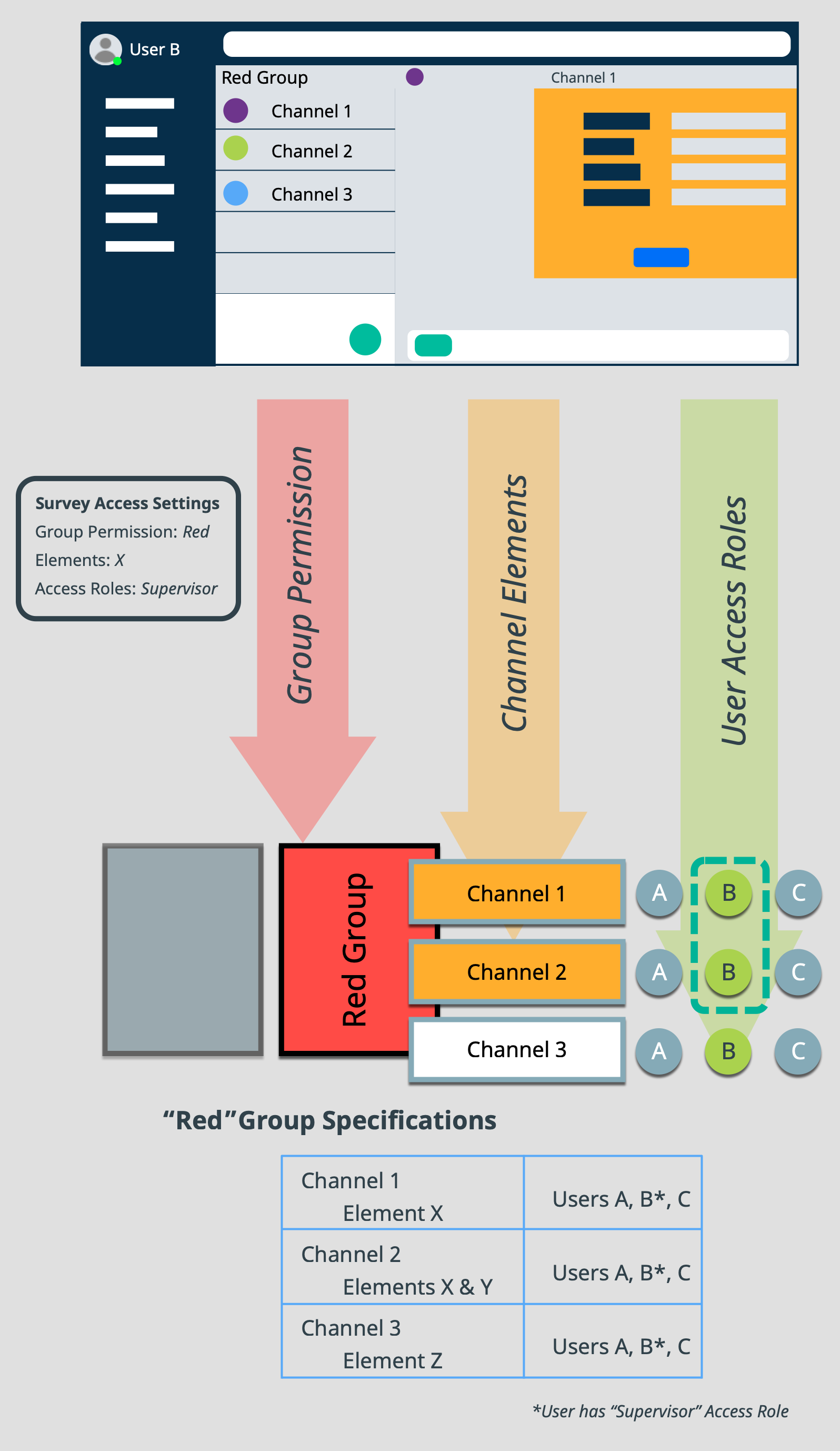Settings Panel
Access the Forms Section
To access the Form panel:
- Press the Administrator button.
- In the Administrative Panel, select Surveys.
- The Forms settings panel opens up.
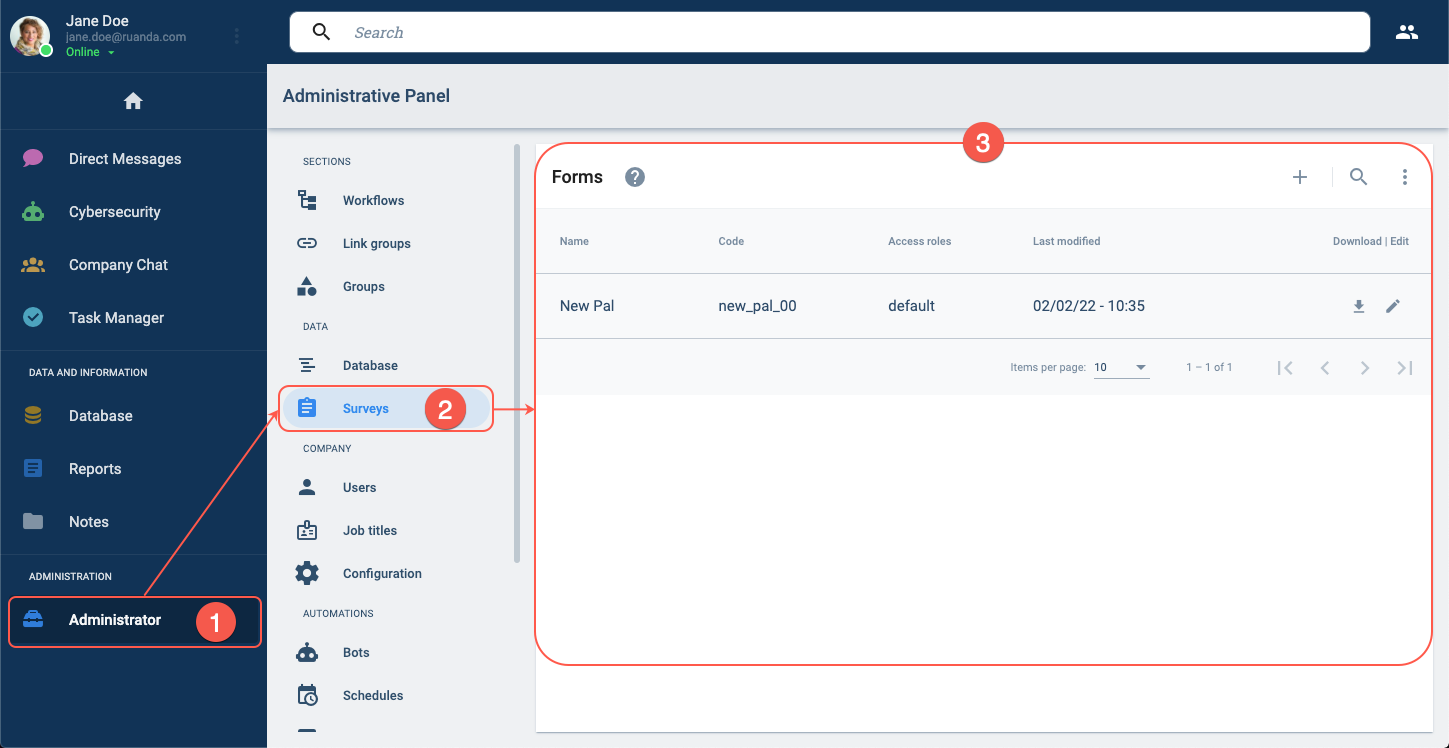
Forms Section Layout
In the Forms section, you can find a list of all active surveys. From here, you can also create, edit, search, and even download surveys.

Actions:
- 1. Create survey: Opens the Create form settings panel.
- 2. Find survey: Search for surveys.
- 3. More options: Gives the option to open a list of disabled surveys.
Table Display and Options:
- A. Name: The survey's display name.
- B. Code: The survey's identification code.
- C. Access roles: Access roles users need to view the survey.
- D. Last modified: Indicates the last time the survey was modified.
- E. Download | Edit: The respective icons permite downloading or editing the corresponding survey.
Create or Edit a Survey
To create a new survey, press the + button. The Create form settings panel opens up.

To edit an existing survey, press the edit icon of the corresponding survey in the list. The Edit form settings panel opens up.

Create/Edit Form Settings Panel Layout
Both the Create form and Edit form settings panels have the same layout which is described below.
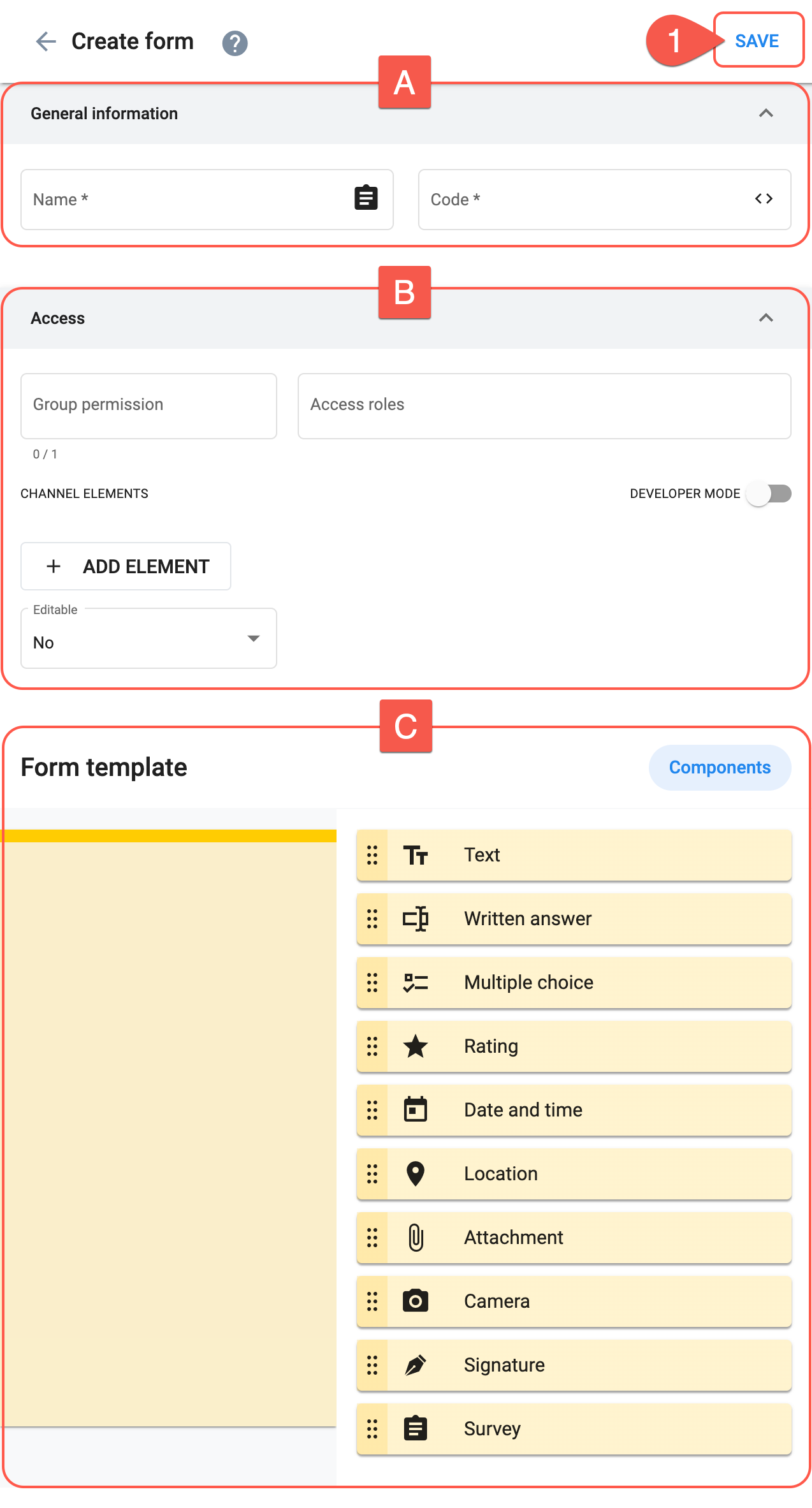
Actions:
- 1. Save: Save current survey settings.
Settings:
- A. General information: Survey identification settings.
- B. Access: Survey access settings.
- C. Form template: Template and components for setting up your survey.
A. General information

B. Access
User access to surveys can be configured through three types of filters: groups, user access roles, and elements associated with channels. They can be used in conjunction to limit which users can access a survey. See the diagram below to see how access settings work.
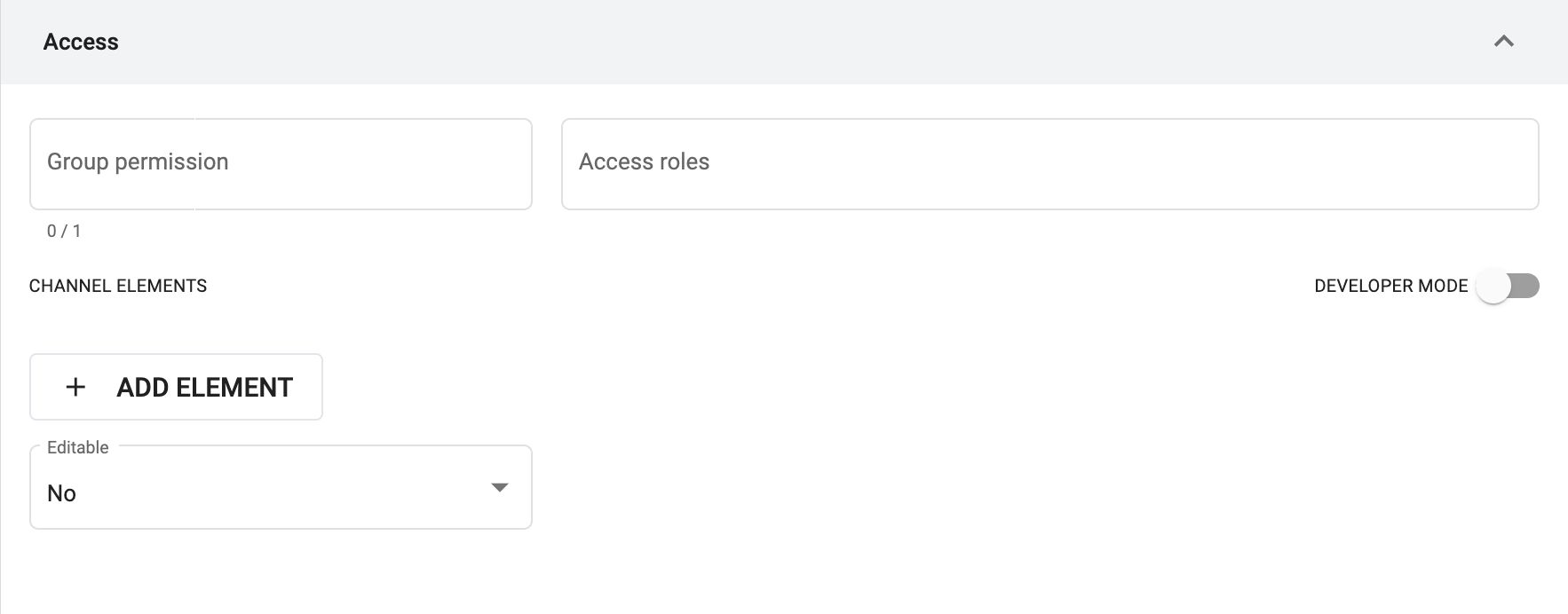
Indicates the access roles users need to be able to fill out the survey.
Go to the Developer Mode Survey Access section for details on about using developer mode.
Determines whether a survey can be edited once it is submitted. Options are:
- Yes : Allows the survey to be edited after submission.
- No : Sets the survey to read-only mode.
- Developer Mode : Allows the use of custom code to program the logic that determines if the survey is editable or not.
By default, surveys are not editable, except for surveys created before the release of this feature (June 2022).
Go to the Developer Mode Survey Editability section for details about using the developer mode.
Example Explanation
In the diagram:
- The group filter is used first, indicating that the survey can only appear within the Red group.
- The Red group has three channels. Initially, the survey could be available in the three channels.
- The second filter used is for channels associated with the "X" element.
- Only two of the group's channels are associated with the "X" element.
- This means that the survey is available in only those two groups.
- Finally, the user access role filter is used.
- In this case, only users with the "Supervisor" access role can use the survey form.
- In the example, only user B has the "Supervisor" access role.
- In conclusion, the survey is available in the Red group's channel 1 and channel 2 only for user B.
- User B cannot access the survey from channel 3.
C. Form Template and Components
Set up the form using different components or input types for setting up questions.
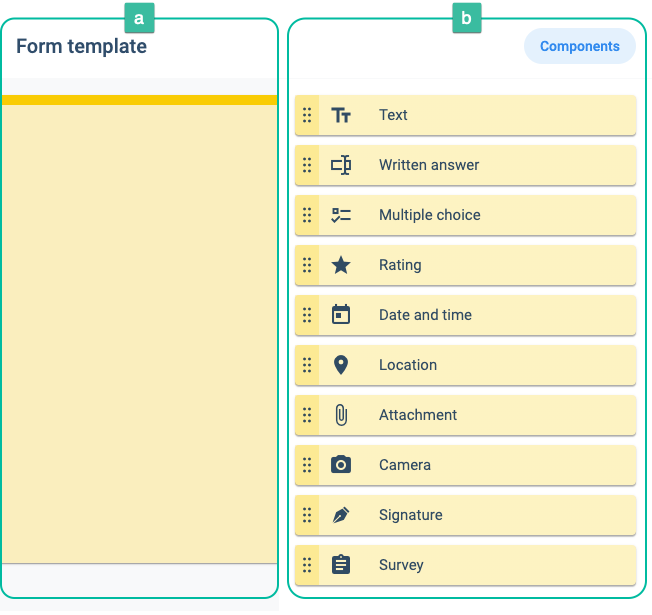
- a. Form Template: Create and organize your survey form here.
- b. Components: List of available input types for your survey form.
a. Form Template
The template permits you to preview how the user will visualize the survey and its components. Bear in mind, a user's visualization might change slightly depending on their web browser.
To add a component to the survey, just drag the component to the template.
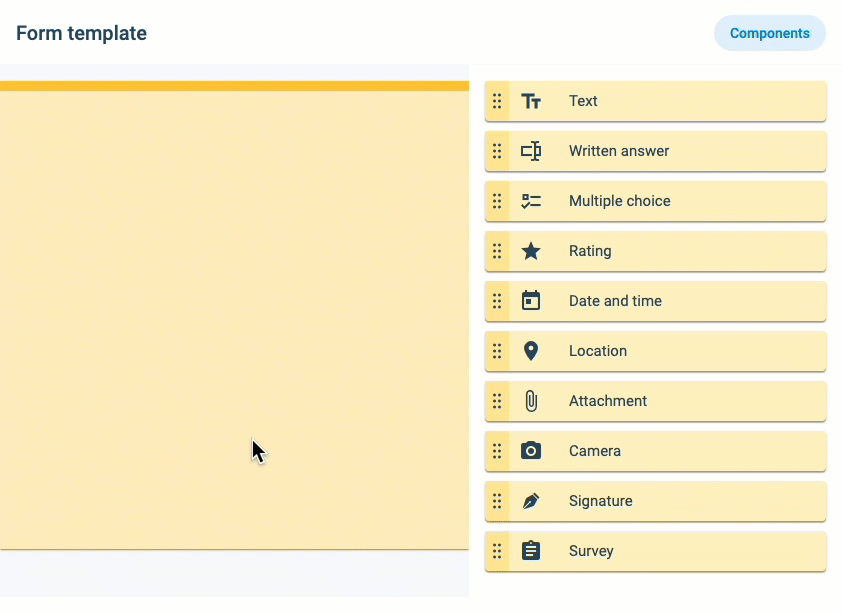
b. Components
Form components are different input types that can be used and configured to make your survey questions.
Press the components button on the upper right side of the section to make the list appear or disappear.
List of available form components:- Text: Inserts text into the survey. Usually used as instructions.
- Written Answer: Users can write a reply to the question. This component can also be configured to read QR Codes or NFC input on mobile devices.
- Multiple choice: Give users multiple-choice questions. This component can be configured as a dynamic survey, i.e., to display more options as certain answers are given.
- Rating: Users can rate an item with "stars".
- Date and time: Answers are received in date or date & time format.
- Location: Current or other GPS location is obtained through an embedded Google Map.
- Attachment: Send almost any type of file through the survey.
- Camera: Send pictures directly from a camera or gallery.
- Signature: Freestyle brush that permits handwriting. Useful for signatures.
- Survey: Adds an existing survey into the survey.
Go to the Components section for more information.
Best Practices
State Change Survey Trigger
If you need a survey to determine the next state of a task, use survey triggers that can be configured from the create/edit state settings panel. For example, if a user is asked to validate a job through a survey, whether it gets validated or not will affect the status of the task.
Survey Triggered Routines
Survey-triggered routines unassociated with task states should be initiated through global bots. If, for example, you wish to plan a Cotalker video call meeting, use a bot to schedule it since there are no state changes involved.
Surveys Associated to Task States
If a survey is to be made available only within a specific task state, the element that represents the state must be associated with the survey. In case the survey has to be available in more than one task state, a collection with elements that are to be required to view the survey should be created.
For example, you can use an element to make a survey available in a channel at a specific moment. First, create the element and associate it manually to the survey. Then you can associate the element to the desired channel through a routine. Afterward, when the state has changed, the associated element can be taken off the channel through another routine to make the survey no longer visible.
Required Fields
When a survey gathers information used by a bot, the fields that provide the data for the routine should be set to required. Fields are set to as required by pressing the required icon found in the form component tabs.
